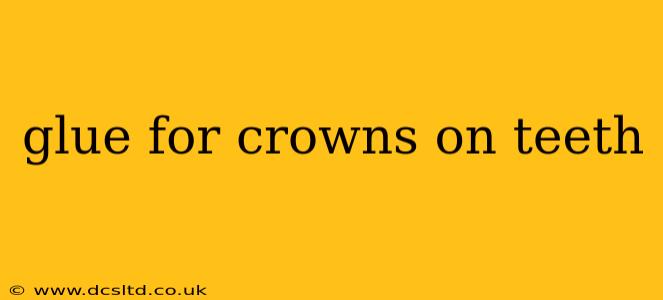Dental crowns are a common restorative treatment used to strengthen and protect damaged teeth. But how do they stay in place? The answer isn't household glue; instead, dentists use specialized dental cements. This article explores the different types of dental cements used for crowns, their properties, and answers frequently asked questions about this crucial aspect of crown placement.
What Type of Glue is Used for Dental Crowns?
The "glue" used for dental crowns isn't glue in the traditional sense. It's a dental cement, a biocompatible material designed to bond the crown securely to the prepared tooth. Several types of dental cements exist, each with unique properties and applications. The choice of cement depends on factors like the type of crown, the condition of the tooth, and the dentist's preference. Common types include:
-
Resin cements: These are popular choices because they offer strong bonding, excellent aesthetics (meaning they're less visible), and relatively easy handling. They often require a light-curing process to harden.
-
Glass ionomer cements: Known for their fluoride-releasing properties, these cements help prevent tooth decay around the crown. They are also generally biocompatible and offer good adhesion.
-
Zinc phosphate cements: While effective, these cements can be more irritating to the tooth's pulp (the inner part of the tooth containing nerves and blood vessels) and are often less aesthetically pleasing compared to resin cements.
-
Hybrid cements: Combining properties of different cement types, these offer a balance of strength, aesthetics, and fluoride release.
What is the Best Cement for Dental Crowns?
There's no single "best" cement for all crown placements. The ideal choice depends on several factors, making it crucial to consult with your dentist. They will assess your individual needs and recommend the most appropriate cement based on:
-
The type of crown: Different crown materials (porcelain, metal, zirconia) may bond better with specific cements.
-
The tooth's condition: If the tooth is sensitive or has a history of decay, a cement with fluoride-releasing properties might be preferred.
-
The dentist's expertise and preference: Dentists often have a preferred cement type based on their experience and the results they've achieved.
How Long Does Dental Cement Last?
The longevity of dental cement depends on various factors, including the type of cement used, the patient's oral hygiene practices, and the overall health of the tooth. Generally, with proper care, the cement should hold the crown securely for many years. However, factors like bruxism (teeth grinding) can increase the risk of cement failure. Regular dental checkups are vital to monitor the condition of the crown and cement.
Can Dental Cement Fail?
Yes, dental cement can fail. This can lead to the crown becoming loose or even falling off. Signs of potential cement failure include:
- Sensitivity: Increased sensitivity to temperature or pressure around the crowned tooth.
- Loose crown: A crown that feels loose or wobbly.
- Discoloration: Noticeable discoloration around the crown's margins.
- Pain: Sharp or persistent pain around the crowned tooth.
If you experience any of these symptoms, it's crucial to contact your dentist immediately.
Is Dental Cement Toxic?
Modern dental cements are designed to be biocompatible, meaning they are safe for use in the mouth. However, like any material placed in the body, there is a potential for allergic reactions in rare cases. Your dentist will take a thorough medical history to assess any potential risks.
How is Dental Cement Applied?
The application of dental cement is a precise procedure performed by a trained dentist. It involves carefully preparing the tooth, selecting the appropriate cement, and accurately placing the cement to ensure a secure bond between the crown and the tooth. This process ensures a proper seal to prevent bacteria from entering and causing decay.
In conclusion, the "glue" for dental crowns is far more sophisticated than ordinary adhesive. Dental cements are carefully chosen materials integral to the success and longevity of crown restorations. Regular dental checkups and good oral hygiene are crucial to maintaining the integrity of the crown and its cement bond.
